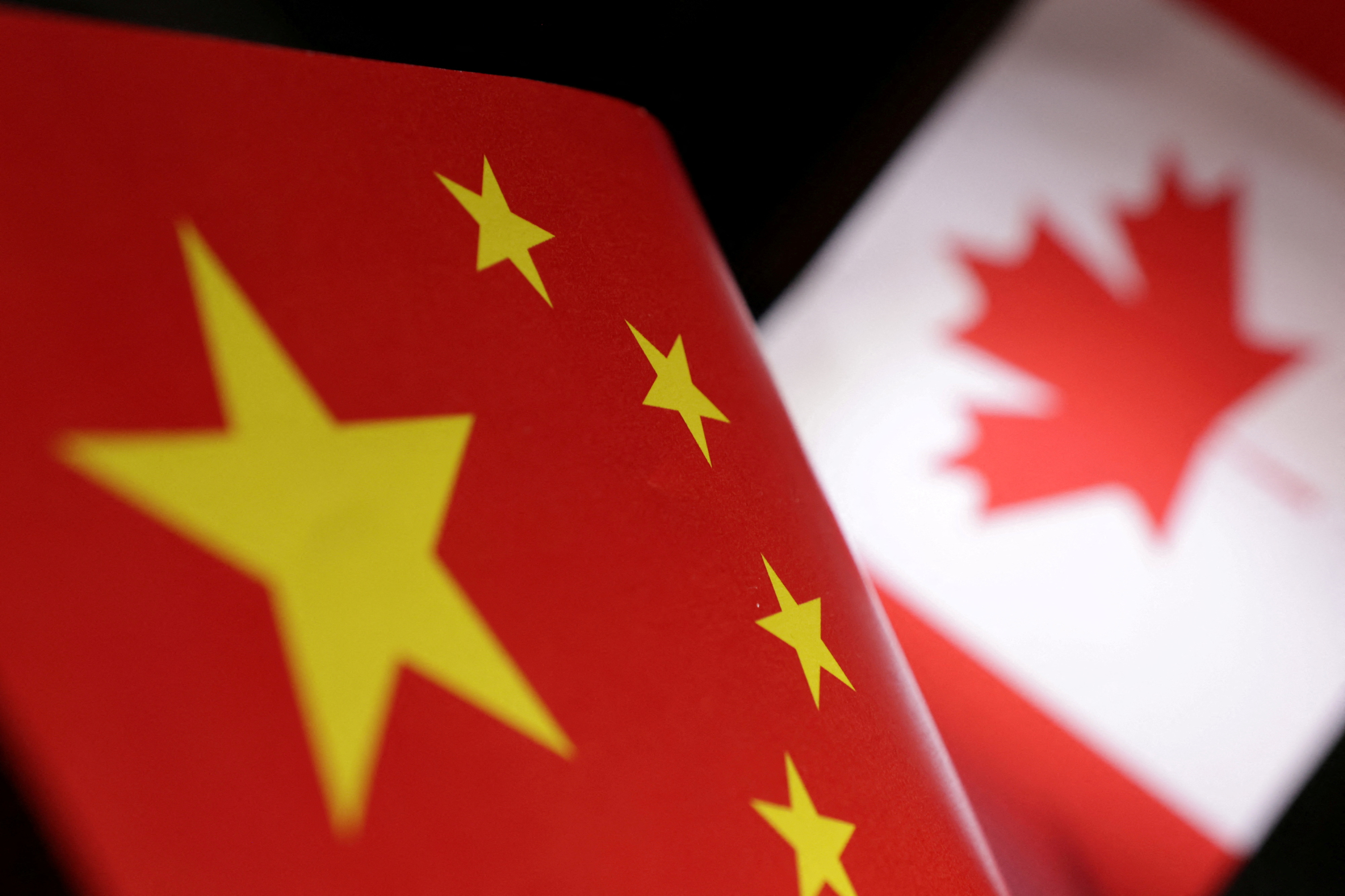Can China And Canada Forge An Alliance To Resist US Hegemony?

Table of Contents
Economic Interdependence and Potential for Cooperation
A closer China-Canada relationship holds considerable economic promise. Both nations stand to gain significantly from increased cooperation.
Trade Relations and Mutual Benefits
Sino-Canadian trade already demonstrates substantial mutual benefit. However, the potential for expansion is vast.
- Increased Canadian resource exports to China: Canada possesses abundant natural resources – timber, minerals, energy – highly sought after by China's rapidly growing economy.
- Chinese investment in Canadian infrastructure: China's significant capital reserves could fund crucial infrastructure projects in Canada, boosting economic growth and creating jobs.
- Technological collaboration: Joint ventures in emerging technologies, such as artificial intelligence and renewable energy, could benefit both countries.
The economic incentives for deepening these ties are compelling. A strengthened economic partnership could lead to increased prosperity for both nations, fostering a stronger foundation for future collaboration.
Diversification of Trade Partners and Reducing Reliance on the US
A robust China-Canada alliance could be instrumental in diversifying trade portfolios and lessening dependence on the US market. This is crucial for both nations in the face of increasing global uncertainty.
- Joint ventures: Collaborative ventures in new markets could reduce vulnerability to fluctuations in the US economy.
- Supply chain resilience: Strengthened bilateral trade could create more resilient and diversified supply chains, mitigating risks associated with geopolitical tensions.
- Exploring new markets together: China's extensive network and Canada's strong international reputation could facilitate joint market penetration efforts in Asia, Africa, and Latin America.
However, reducing US economic influence carries risks. Navigating the complexities of decoupling from the US market requires careful strategic planning and a clear understanding of potential economic repercussions.
Shared Concerns Regarding US Foreign Policy
Beyond economic considerations, both China and Canada share anxieties about aspects of US foreign policy.
Challenges to Multilateralism
The US approach to international relations has been criticized for its unilateralism and its perceived challenges to multilateral institutions and global governance.
- Withdrawal from international agreements: The US withdrawal from the Paris Agreement on climate change and the Iran nuclear deal exemplifies this trend.
- Trade disputes: US trade policies, including tariffs and trade wars, have destabilized the global trading system.
- Sanctions: The use of unilateral sanctions has been criticized for undermining international law and harming global economic cooperation.
Both China and Canada advocate for a rules-based international order and actively participate in multilateral institutions, sharing concerns about the erosion of multilateralism.
Defense and Security Cooperation (Limited Scope)
While a full-fledged military alliance is highly unlikely, limited cooperation in specific areas is conceivable.
- Joint research initiatives: Collaboration on cybersecurity threats and climate change research could be mutually beneficial.
- Information sharing: Limited information sharing on issues of mutual concern, such as Arctic security, might be possible.
- Collaborative efforts on climate change in the Arctic: Both nations have significant interests in the Arctic region and could collaborate on environmental protection and sustainable development.
However, significant differences in military capabilities and strategic goals limit the scope of potential defense cooperation. Any collaboration would need to be carefully calibrated to avoid jeopardizing either country's broader foreign policy objectives.
Obstacles and Challenges to a China-Canada Alliance
Despite potential benefits, substantial obstacles hinder the formation of a formal China-Canada alliance.
Human Rights Concerns and Political Differences
China's human rights record poses a significant challenge to closer ties with Canada.
- Concerns about Xinjiang, Hong Kong, Taiwan: Canada has expressed serious concerns about China's human rights practices in these regions.
- Canadian commitment to human rights: Canada's commitment to human rights and international norms creates a fundamental tension with China's authoritarian system.
These differences significantly complicate the possibility of a strong alliance, as Canada's commitment to human rights values would likely prevent unqualified support for China's policies.
US Influence and Pressure
The US exerts considerable influence over Canada, potentially hindering closer ties with China.
- Diplomatic pressure: The US could use diplomatic pressure to dissuade Canada from forging a closer relationship with China.
- Economic sanctions: The US might employ economic sanctions or other punitive measures to discourage closer cooperation.
- Security concerns: The US could raise security concerns to oppose closer ties between Canada and China.
Canada's close ties to the US and its integration into North American security structures make defying US pressure a significant challenge.
Domestic Political Constraints in Canada
Domestic politics in Canada further complicates the prospect of a strong alliance with China.
- Public opinion: Canadian public opinion on China is complex and often divided.
- Political opposition: Political parties in Canada hold differing views on China, potentially creating internal divisions on foreign policy.
- Media scrutiny: The media plays a significant role in shaping public opinion and influencing government policy toward China.
These factors create political constraints on the government's ability to forge a closer relationship with China, especially one perceived as adversarial to the US.
Conclusion
The potential for a closer China-Canada relationship exists, driven by significant economic opportunities and shared concerns about certain aspects of US foreign policy. However, a formal "China-Canada alliance to resist US hegemony" faces formidable obstacles: significant human rights concerns, the potential for US pressure, and domestic political constraints within Canada. While full-fledged alliance is unlikely in the near future, exploring increased cooperation in specific areas remains a possibility. Further research into the evolving China-Canada relationship is essential to understand its future implications in a multipolar world. The ongoing evolution of the geopolitical landscape demands careful analysis of the potential benefits and risks associated with a closer Sino-Canadian relationship.

Featured Posts
-
 China Seeks Canadian Partnership To Counter Us Actions
Apr 25, 2025
China Seeks Canadian Partnership To Counter Us Actions
Apr 25, 2025 -
 Ray Epps V Fox News A Deep Dive Into The January 6th Defamation Lawsuit
Apr 25, 2025
Ray Epps V Fox News A Deep Dive Into The January 6th Defamation Lawsuit
Apr 25, 2025 -
 Manalapan Floridas Next Palm Beach The Super Rich Influx
Apr 25, 2025
Manalapan Floridas Next Palm Beach The Super Rich Influx
Apr 25, 2025 -
 Newton Aycliffes Clique Salon Achieves Echo Top Ten Ranking
Apr 25, 2025
Newton Aycliffes Clique Salon Achieves Echo Top Ten Ranking
Apr 25, 2025 -
 Bbvas Long Term Investment Banking Strategy A Cfo Perspective
Apr 25, 2025
Bbvas Long Term Investment Banking Strategy A Cfo Perspective
Apr 25, 2025
Latest Posts
-
 2025 12
Apr 30, 2025
2025 12
Apr 30, 2025 -
 23 2025 12
Apr 30, 2025
23 2025 12
Apr 30, 2025 -
 Black And Asian Police Officers Tweet About Chris Rock Sparks Investigation
Apr 30, 2025
Black And Asian Police Officers Tweet About Chris Rock Sparks Investigation
Apr 30, 2025 -
 23 2025
Apr 30, 2025
23 2025
Apr 30, 2025 -
 Police Leader Investigated Over Chris Rock Tweet Free Speech Concerns
Apr 30, 2025
Police Leader Investigated Over Chris Rock Tweet Free Speech Concerns
Apr 30, 2025
